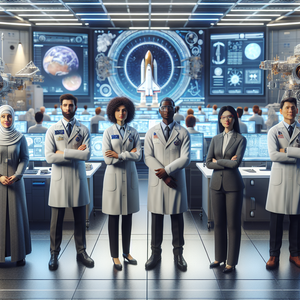Navigating the Future: How Proteus Space is Shaping Space Exploration

At the heart of Proteus Space's mission is the development of cutting-edge technologies that address some of the most pressing challenges in space exploration. One of their notable projects is the advancement of satellite technology. Proteus Space is working on miniaturized satellites that not only reduce launch costs but also enhance the capability to gather data from various celestial bodies. These advancements allow for more frequent and detailed observations, facilitating scientific research and commercial applications alike. For example, Proteus Space recently collaborated with a leading university to develop a satellite equipped with advanced imaging sensors. This satellite aims to monitor environmental changes on Earth and assess the potential for future terraforming projects on Mars. The project exemplifies how Proteus Space merges academic research with practical applications, driving innovation in both fields. Another significant area of focus for Proteus Space is the development of autonomous spacecraft systems. These systems are designed to operate independently in harsh extraterrestrial environments, enabling more ambitious missions, including crewed missions to Mars. The company’s commitment to advancing robotic technologies not only enhances mission efficiency but also ensures the safety of astronauts during critical exploration phases.
Strategic Partnerships Driving Progress
Collaboration is key to success in the complex arena of space exploration, and Proteus Space understands this well. The company has established partnerships with several organizations, including aerospace manufacturers, research institutions, and government agencies. These collaborations not only pool resources but also enhance the exchange of ideas and expertise. One significant partnership is with a prominent aerospace firm focused on rocket propulsion technology. Together, they are exploring sustainable fuel options that could revolutionize how rockets are powered, reducing the environmental impact of space missions. Such initiatives are crucial as the global community becomes more aware of sustainability issues, even in the exploration of outer space. In addition, Proteus Space has engaged in cooperative efforts with international space agencies, such as NASA and ESA, to align their research objectives with broader global missions. These partnerships allow for shared knowledge and resources, ultimately contributing to the acceleration of technological advancements.
Contributions to Space Exploration Technologies
Proteus Space's influence extends beyond their own projects; they are actively contributing to the development of broader space exploration technologies. Their work on spacecraft autonomy and robotics is particularly noteworthy. By developing autonomous systems capable of operating in harsh extraterrestrial environments, Proteus Space is paving the way for more ambitious missions, including crewed missions to Mars. A recent demonstration of their robotic technologies involved a prototype that successfully simulated a Martian terrain exploration mission. This prototype showcased the ability to navigate obstacles, collect samples, and transmit data back to Earth autonomously. Such advancements not only enhance mission efficiency but also ensure the safety of astronauts during critical exploration phases. Furthermore, Proteus Space’s initiatives in developing satellite-based Earth observation systems have implications for climate monitoring and disaster management, showcasing their commitment to addressing issues that affect life on Earth while expanding our reach into space.
Impact on the Aerospace Sector
The innovations and research initiatives at Proteus Space are not just theoretical; they have real-world implications for the aerospace sector. By pushing the boundaries of what is possible, Proteus Space is helping to lower the barriers to entry for new players in the space industry. Their advancements in satellite technology and spacecraft autonomy, for instance, are enabling smaller companies and startups to participate in space exploration, fostering a more competitive and diverse landscape. Moreover, the focus on sustainability in their partnerships and projects aligns with the growing demand for environmentally responsible practices across all industries. As Proteus Space leads the charge in developing greener technologies, they set a precedent for others in the field, encouraging a collective move toward sustainable exploration.
Career Opportunities and Locations
Proteus Space offers a variety of career paths that cater to a range of skill sets and expertise. Positions range from engineering roles in spacecraft design and satellite technology development to research positions in astrophysics and environmental science. They also have openings for project management, business development, and marketing professionals who can help drive the company's mission forward. The company has offices located in key aerospace hubs, including: - **Los Angeles, California**: This office focuses on spacecraft design and development, leveraging the city's rich aerospace ecosystem. - **Houston, Texas**: With its proximity to NASA’s Johnson Space Center, this location is pivotal for partnerships and research related to human spaceflight. - **Boulder, Colorado**: Known for its emphasis on research and technology, this office supports satellite technology and environmental monitoring projects.
Proteus Space is not merely a company involved in space exploration; it is a trailblazer that is shaping the future of how humanity interacts with the cosmos. Through innovative technologies, strategic partnerships, and a commitment to sustainability, Proteus Space is at the forefront of a new era in aerospace, one that promises to expand our understanding of space while also addressing the challenges of our planet. As they continue to push the envelope, the contributions of Proteus Space will undoubtedly inspire future generations of explorers, engineers, and scientists to reach for the stars. Their holistic approach—merging cutting-edge technology with academic research and a focus on sustainability—positions them as a leader in the ongoing journey into the final frontier.
Satellite Systems Engineer
Northrop Grumman, Boeing, Lockheed Martin
Core Responsibilities
Design and develop satellite systems, including payloads and subsystems for Earth observation and deep space exploration missions.
Conduct performance analysis and simulations to ensure satellite systems meet mission requirements and constraints.
Collaborate with cross-functional teams, including software engineers and project managers, to integrate satellite components and ensure timely project delivery.
Required Skills
Proficiency in satellite design tools (e.g., MATLAB, STK) and familiarity with RF communication systems.
Strong analytical skills and experience with system engineering principles.
A degree in aerospace engineering or a related field, with experience in satellite missions preferred.
Autonomous Systems Software Developer
SpaceX, Blue Origin, NASA contractors
Core Responsibilities
Develop and optimize software algorithms for autonomous spacecraft navigation, obstacle detection, and data collection.
Implement machine learning techniques to enhance autonomous decision-making capabilities in extraterrestrial environments.
Test and validate software in simulations and real-world environments to ensure reliability during missions.
Required Skills
Proficiency in programming languages such as Python, C++, or ROS (Robot Operating System).
Experience with simulation tools (e.g., Gazebo, V-REP) and familiarity with AI/ML frameworks.
A background in computer science, robotics, or related fields, with specific experience in aerospace applications being a plus.
Environmental Scientist (Space Applications)
NASA, ESA, environmental consultancies
Core Responsibilities
Conduct research on the environmental impacts of space missions and develop strategies to mitigate these effects.
Analyze data from satellite missions to monitor Earth's environmental changes and assess potential terraforming impacts on other planets.
Collaborate with engineers and researchers to incorporate environmental considerations into mission planning and technology development.
Required Skills
Strong analytical and data interpretation skills, with experience in remote sensing and geospatial analysis.
Knowledge of environmental science principles and familiarity with climate modeling software.
A degree in environmental science, ecology, or a related field, along with experience in space-related projects is advantageous.
Project Manager for Aerospace Initiatives
Raytheon Technologies, Lockheed Martin, aerospace firms
Core Responsibilities
Oversee project timelines, budgets, and resource allocation for space exploration projects from conception through execution.
Facilitate communication between engineering teams, stakeholders, and partner organizations to ensure alignment on project goals.
Mitigate risks and resolve issues that arise during the project lifecycle, ensuring successful project delivery.
Required Skills
Strong leadership and organizational skills, with experience managing multidisciplinary teams in a technical environment.
Familiarity with project management methodologies (e.g., Agile, Waterfall) and tools (e.g., MS Project, Jira).
A degree in engineering, business administration, or a related field, with PMP certification being a plus.
Robotics Engineer (Space Exploration)
NASA, JPL, robotics firms
Core Responsibilities
Design and develop robotic systems for planetary exploration, including rovers and drones capable of operating in harsh environments.
Conduct tests and simulations to evaluate robot performance and refine design based on operational feedback.
Collaborate with scientists and engineers to integrate scientific instruments with robotic platforms for data collection.
Required Skills
Proficiency in robotics design software (e.g., SolidWorks, ROS) and hands-on experience with robotic systems.
Strong programming skills in languages such as C++ or Python, with experience in control systems and automation.
A degree in robotics, mechanical engineering, or a related field, with experience in aerospace applications preferred.


